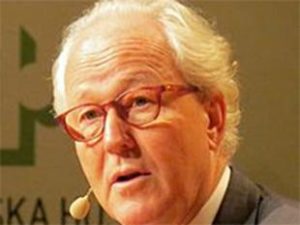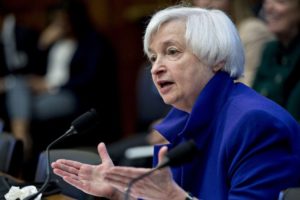 President Donald Trump vowed to end business as usual in Washington. Global companies are now learning just what that means.
President Donald Trump vowed to end business as usual in Washington. Global companies are now learning just what that means.
 President Donald Trump vowed to end business as usual in Washington. Global companies are now learning just what that means.
President Donald Trump vowed to end business as usual in Washington. Global companies are now learning just what that means.
 The Central Board of Direct Taxes (CBDT) on Tuesday issued the much-awaited “guiding principles” for determination of a Place of Effective Management (PoEM) of a company, scotching speculation that the Budget may see its removal from the statute book.
The Central Board of Direct Taxes (CBDT) on Tuesday issued the much-awaited “guiding principles” for determination of a Place of Effective Management (PoEM) of a company, scotching speculation that the Budget may see its removal from the statute book.
Put simply, PoEM means a place where key management and commercial decisions that are necessary for the conduct of the business of an entity as a whole are, in substance, made.
The CBDT guidelines come barely two months before the end of fiscal year 2016-17, in which PoEM had become legislatively effective, giving little time for Indian multinationals to prepare for the new regime.
The main objective of introducing PoEM was to ensure that companies incorporated outside India but controlled from India do not escape taxation here. It also brings in the concept of residency of corporates with internationally accepted principles, say tax experts.
Girish Vanvari, National Head of Tax, KPMG in India, said that the guidelines stress on substance over form. “They attempt to differentiate between shareholder control, management control and routine decisions. Whilst the guidelines are comprehensive, they are subjective on substance and can be challenged for interpretation in many places,” he said.
Narrower application
Rohinton Sidhwa, Partner, Deloitte, Haskins & Sells LLP, said that what has been released has a narrower application than what was originally proposed. They are also supplemented with examples on isolated facts that will not lead to a PoEM as also illustrative interpretations. The legislative amendment was effective from April 1, 2016, whereas the guidelines are being released only today, Sidhwa pointed out.
Hitesh Sawhney, Partner — Direct Tax, PwC, said thatCBDT has clarified that the intent of PoEM provisions is to target shell companies/companies that are created to retain income outside India and not Indian MNCs engaged in business overseas.
Stress on substance
Aseem Chawla, Managing Partner, ASC Legal, a law firm, said that the finalised guidance relies on substance over form and that routine operational decisions shall not be relevant for PoEM determination.
“Also a panel of three commissioners is to affirm the proposed decision of the assessing officer on the PoEM of a foreign company. Hopefully, this will not impinge upon the right to appeal by the foreign company before a judicial forum,” he added.
Now that the final guidelines are out, will the government go ahead with a Controlled Finance Corporation (CFC) structure or not? Says Daksha Baxi, Executive Director, Khaitan & Co: “My personal view is that CFC is a better anti-avoidance provision, less prone to subjectivity and therefore less litigative.” It seems that at least for the current year, where PoEM is applicable, the government wants to ensure that the provision can be properly implemented, she said.
Rahul K Mitra, Head of Transfer Pricing & BEPS, KPMG in India, said: “With guidelines for PoEM out, it looks like they may not be introducing CFC.”
Jiger Saiya, Partner – Direct Tax, BDO India, echoed his thoughts, saying the “government seems inclined towards implementing the PoEM framework rather than introducing an alternative measure.”

The International Monetary Fund on Monday slashed India’s gross domestic product (GDP) growth forecast by 100 basis points (bps) to 6.6% in FY17 and by 40 bps to 7.2% in FY18, citing a consumption slump after the demonetisation of high-value notes.
The downward revision, if it translates into reality, will let China reclaim, albeit temporarily, the fastest growing major economy tag from India. China’s economy is now expected to grow by 6.7% in 2016, 10 bps higher than the fund’s October 2016 forecast. The communist country is expected to clock 6.5% in 2017, 30 bps higher than estimated earlier, again ceding the fastest growing economy status to India.

“In India, the growth forecast for the current and next fiscal year were trimmed by 1 percentage point and 0.4 percentage point, respectively, primarily due to the temporary negative consumption shock induced by cash shortages and payment disruptions associated with the recent currency note withdrawal and exchange initiative,” the IMF said in its latest World Economic Outlook Update.
The revision comes barely four months after it revised upward by 20 bps India’s FY17 GDP growth to 7.6% in October 2016. The IMF’s cut in growth outlook for India is sharper than the recent World Bank’s 60 bps reduction in its India GDP growth outlook to 7% for FY17. In its first advance estimate, India’s Central Statistical Office has projected that the economy will slow to 7.1% in the current financial year from 7.6% in 2015-16. Given the post-demonetisation hit to consumption and investment, many analysts said these might prove to be overestimates.
Advanced economies are now projected to grow by 1.9% in 2017 and 2% percent in 2018, 0.1 and 0.2 percentage point more than in the October forecast, respectively. As noted, this forecast is particularly uncertain in the light of potential changes in the policy stance of the United States under the incoming Donald Trump administration.

India’s share of global economy to increase: Lars Heikensten, Executive Director, Nobel Foundation
Lars Heikensten, executive director of the Nobel Foundation, said he expects India’s share of the global economy to increase while commenting on the role of the country in the emerging world order, ahead of the biennial Vibrant Gujarat Global Summit.
“For decades, the western world has been standing up for democracy, science and facts. Now these values are being questioned. Democratic countries like India, which also have a growing role in the world, need to step up. I think the policies of India are important,” he said. “The world needs more of values that India has been building since the 40s.”
The investor summit will for the first time see the participation of a galaxy of Nobel Laureates apart from various heads of state and global corporate leaders. The Nobel Foundation is the institution that manages the Nobel prizes for physics, chemistry, medicine, literature and peace.
Heikensten emphasised the need for adequate infrastructure to connect people to the digital economy. “In my country Sweden, everyone is connected today. With more people being connected in India, you will see people shifting to digital transactions,” he added.
He also addressed the digital divide and the need to bridge this chasm. “Digitisation is part of our lives and necessary but it does have consequences,” he said.
Heikensten has been governor of the Swedish Central Bank and held various positions in the Swedish ministry of finance, including that of director general and head of the economic affairs department.
“There are risks (with digitisation) and IT policies need to address these issues,” he told ET. “This is not something that will solve itself. People have been left behind in the process and I expect we shall see more and more academic debate on how to keep fairly equal, at the same time we have good economic development… The populist movements in the western countries reflect that people are left behind.”
He said that Sweden, for instance, has become less equal over the years.
“This is not the whole story part but an important part of the story,” Heikensten said. “But it is still very equal compared to the United States where there are wider income differentials between people.”
The link between digitisation of the economy and inequality is not a straightforward one. However, he pointed out that this marks the way forward and said that “we will see more and more countries moving towards digitisation as lot less cash is being used now than before.”
He said that India was one of the countries buying notes from Sweden.
Source: http://economictimes.indiatimes.com/articleshow/56533782.cms
 Federal Reserve Chair Janet Yellen said the U.S. economy faces no serious short-term obstacles, though it must deal with important long-term challenges of low productivity and growing inequality.
Federal Reserve Chair Janet Yellen said the U.S. economy faces no serious short-term obstacles, though it must deal with important long-term challenges of low productivity and growing inequality.
“Unemployment has now reached a low level, the labor market is generally strong and wage growth is beginning to pick up,” Yellen said Thursday in a meeting with educators. “Inflation has moved up from a very low level, and it’s a little bit under our 2 percent objective, but it’s pretty close.”
The Fed increased interest rates last month for the first time in a year, to a range of 0.5 percent to 0.75 percent, after judging that near-term risks to the outlook “appear roughly balanced.” Policy makers also indicated they expect to hike three times in 2017, according to the median estimate of their quarterly forecast.
Unemployment was 4.7 percent in December, a slight uptick from November when it reached 4.6 percent, its lowest level since 2007. The Fed’s preferred gauge of inflation, minus food and energy components, was 1.6 percent in the 12 months through November.
Yellen said productivity, a “key determinant” of living standards over the long term, remained at historically low levels and economists were struggling to understand why. Related to low productivity, she said a greater share of income gains were going to workers with higher education, causing inequality to rise in the U.S.
Education and workforce development have been frequent topics of discussion for Fed officials in recent years as technology continues to drive changes in the workplace. Yellen told graduating college students in Baltimore last month that career success will increasingly be linked to education.
Yellen on Thursday was speaking to teachers gathered in the board room at the Fed’s headquarters in Washington and, via web cast, to others through the country. She also touted reforms to banking regulation that followed the financial crisis aimed at making the financial sector safer and more resilient.
“These are very important changes,” Yellen said. “I certainly wouldn’t want to see them rolled back.”
Members of the incoming administration of President-elect Donald Trump have said they will seek to dismantle the 2010 Dodd-Frank Act, the principle legislative response to the crisis.
 Foreign law and accountancy firms now have a chance to operate in India on their own. On January 3, the ministry of commerce and industry amended a rule allowing such foreign firms to set up offices and advise clients from SEZs. The move will initially benefit Gujarat International Finance Tec-City (GIFT).
Foreign law and accountancy firms now have a chance to operate in India on their own. On January 3, the ministry of commerce and industry amended a rule allowing such foreign firms to set up offices and advise clients from SEZs. The move will initially benefit Gujarat International Finance Tec-City (GIFT).
Current regulations so far do not permit multinational law firms to operate in the country. Indian law and accountancy firms were also not allowed to operate from any of the SEZs. That rule has now been amended which would benefit financial centres.
The notification, dated January 6 but issued on January 3, by the department of commerce allows foreign law and accountancy firms to be established in SEZs. The earlier version of the rule, prior to the amendment, had excluded legal services and accounting.
“This will be the big enabler for the legal and accounting firms to expand their services in multi-services SEZ with IFSC (International Finance Service Centre) and thereby export their services to various global players,” said Nitin Potdar, partner, J Sagar, a law firm. As of now, only GIFT is a multi-services SEZ with an IFSC in India.
“Until now, no foreign law firm could operate in India and not even Indian firms were allowed to provide their services in any of the SEZs. The new amendment allows not only Indian law or accountancy firms to set up a base in GIFT, but even multinationals can directly advise upon international disputes or arbitration by setting up a base there,” Dipesh Shah, head, IFSC at GIFT, told ET.
While many foreign professional services firms such as Deloitte, PwC, KPMG and EY are present in India, they cannot directly operate as auditors and require an Indian affiliate. This amendment does away with that requirement at least in the case of GIFT.
Many Indian law firms have been opposing the entry of multinational law firms in India for some time. Going ahead, many multinationals could set up base in India but they will only be able to advise on cross-border transactions or disputes. Some are also looking to quickly take advantage of this and set up base in GIFT.
“Allowing law firms in GIFT for arbitration or other work would work as a catalyst for economic activities in the country. We ourselves are in discussions to set up an office in GIFT,” said Nishith Desai, founder of law firm Nishith Desai Associates.
But the amendment does not permit foreign law firms to advise Indian clients on local businesses and regulations. Their advice and help would be strictly restricted to arbitrations fought in GIFT, international mergers and acquisitions, international taxation or any other advice for operations outside India.
Industry experts say some foreign law firms may consider partnerships with Indian firms under the arrangement. There could also be stiff competition as both Indian and foreign firms would compete for the same clients in GIFT.
“Many law firms may set up their base in GIFT but that would take some time. And I am a firm believer that it would only lead to betterment of all law firms,” said Desai.
Source: http://economictimes.indiatimes.com/articleshow/56529046.cms
 The world’s largest and first fully integrated industrial park has been opened in Tamil Nadu by a NRI-owned multinational group based in the UAE that specialises in innovative offsite manufacturing technology.
The world’s largest and first fully integrated industrial park has been opened in Tamil Nadu by a NRI-owned multinational group based in the UAE that specialises in innovative offsite manufacturing technology.
KEF Infra, the infrastructure subsidiary of KEF Holdings yesterday launched the KEF Infra One Industrial Park, the fully integrated offsite manufacturing park in Krishnagiri, Tamil Nadu.
The park is built on an area of one million square feet and developed at an investment of Rs 650 crore, the company said in a release.
The chief guest for the occasion was Narayana Murthy, Founder of Infosys and Faizal E Kottikollon, Founder and Chairman, KEF Holdings, Shabana Faizal, Vice Chairperson, KEF Holdings, Sumesh Sachar, CEO, KEF Infra among others were also present.
The park features a diverse range of cutting-edge technology that can revolutionise manufacturing and delivery processes in the construction industry.
“Today, India is at the cusp of growth led by innovation and we are pioneering an age where technology is being effectively integrated into infrastructure, thus heralding industrial revolution 4.0. Our aim is to fast forward this progress by radically changing the landscape of infrastructure in India.
“Offsite manufacturing of infrastructure reduces delivery time by up to two-thirds, thereby speeding up the construction process. The launch of KEF Infra One is a step towards our vision of pushing forth the next phase of India’s growth through world class infrastructure and we are proud to present this to the world,” Kottikollon said who was born into an industrialist family in Kerala.
Narayana Murthy said India has always been on the path of development, and with the arrival of technology, has witnessed exponential growth.
“However, every sector that contributes to India’s progress is supported by infrastructure that is future-ready. This is where KEF Infra is a true pioneer and is helping shape the future of the infrastructure industry as well as that of the country as a whole,” he said.